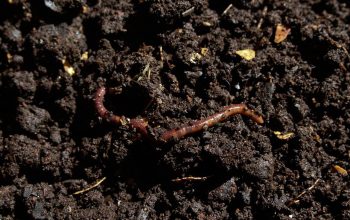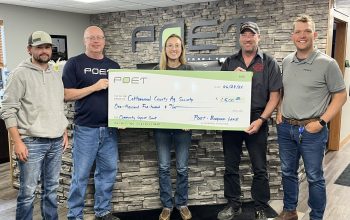According to Jeff Hansen, President & CEO of Iowa Select Farms (ISF), proper depopulation methods are being used to humanely dispose of market-ready hogs during the COVID-19 pandemic. The backlog at processing plants has caused this action, and producers need to move those animals out to disinfect barns (usually done anyway) to get them ready for the next batch to come in.
“As we know, the highly contagious nature of COVID-19 has impacted the food supply chain,” stated Hansen. “A significant number of processing plants have had to shut down temporarily or reduce their capacity because employees have tested positive for the coronavirus. This decrease in capacity has created a backlog of hundreds of thousands of pigs staying on farms.”
He stresses his team at ISF has done an extraordinary job of managing the unexpected challenges of caring for thousands of additional pigs with no place to go. “We have exhausted every possible option when it comes to handling this unplanned surplus, including finding additional barn space, donating pigs to the ‘Pass the Pork’ program for food banks and processing pigs and gifting that to our employees,” said Hansen.
Every U.S. pork producer has been forced to make difficult decisions on how to manage the impact of this backlog on their operation. Sadly, ISF were forced to make the painful decision to depopulate some of its herd. “We worked with industry-leading animal welfare experts, veterinarians and technical experts to design this heart-wrenching task,” continued Hansen. Both veterinary and production well-being professionals are overseeing the process to ensure that such efforts are carried out in full accordance with recommendations of both the American Association of Swine Veterinarians (AASV) and the American Veterinary Medical Association (AVMA).
According to information from the AASV, the procedure for shutdown includes closing up all facility openings, shutting inlets of fresh air and turning off the huge ventilation fans. That will eventually cause the buildup of both excessive temperatures and moisture from body heat and respiration of the animals, resulting in eventual death from hyperthermia. Additional heat and steam were added to the building to accelerate this process.
It should only be used in facilities with the capability to adequately increase air temperature and relative humidity to a level that results in at least a 95 percent death rate in less than an hour. Use of additional heat sources and CO2 will achieve the goal of 100 percent mortality. After the procedure is completed and ventilation resumed in the facility, death will be confirmed by veterinary professionals and a backup euthanasia method applied to any remaining live animals.
Chris Rademacher, an ISU Extension swine veterinarian, said shutting down ventilation is one of the few approaches to depopulating large numbers of pigs. It’s safer, both physically and mentally, for farmers and caretakers than shooting, electrocution or other methods, which are more appropriate options when euthanizing a small number of animals.
However according to Hansen, not everyone is happy with this more humane method. Direct Action Everywhere has released illegal footage captured from inside of a barn used for depopulating animals that were meant for the food supply and had nowhere to go.
“These animals were raised to feed families,” said Hansen. “To face this reality has been devastating for all of us. It is no surprise that, at this most difficult moment, an animal activist group is attempting to use this to promote their own agenda.” He goes on to say that they illegally infiltrated an ISF facility and installed cameras to record video of the euthanizing process and their team members. The now released video is tragic and unfortunate. “We are in tremendous pain knowing that this awful decision had to be made, and recording and releasing video of the process only reinforces the hurt our team feels,” he said.
He concludes by saying that this is not the outcome any of ISF’s producers would ever hope for. “We remain committed to caring for our people, animals, environment and communities so we continue the noble calling of feeding families around the world,” said Hansen. “These are dark days for our team and all farmers, but like the generations that came before us, we will remain strong.”
In the latest updated information received through ISF’s communication director Jen Sorenson, the company wishes to share their progress in dealing with supply chain interruptions. The press release states that meatpacking plants have recovered more quickly than anticipated, and are now operating at more than 90 percent capacity. This helps tremendously in alleviating the backlog of pigs on farms. They are also pleased to announce they have secured leased finishing space with capacity for 60,000 pigs, and are expediting plans to complete 17 new finishing farms in the next 12 weeks. All of this will increase their holding capacity significantly. In addition, they have deployed a nutrition strategy that is effectively slowing the weight gain of the pigs, ensuring that they will not exceed the limits for safe processing.
The meat packing plant recovery, and efforts by ISF, has allowed them to discontinue depopulation procedures of market-ready hogs. “The situation is fluid, yet we are cautiously optimistic that we will never again have to face a difficult decision like we had to face last month and that’s even as COVID-19 continues to be a factor in our industry,” said Hansen. “We remain appreciative of the men and women working at the packing plants who are keeping the lines running and a steady supply of pork on grocery shelves. We are incredibly grateful to the hard-working team at ISF who have faced many challenges this year with grace and grit.”
Hansen feels this is a bright spot in an otherwise very difficult last few months, and that no producer wants to have to make some of the decisions they have had to make. “We remain committed to responsibly producing safe, nutritious, high quality pork and in fulfilling our values every day by taking care of our people, our animals, our communities and our environment,” said Hansen.







